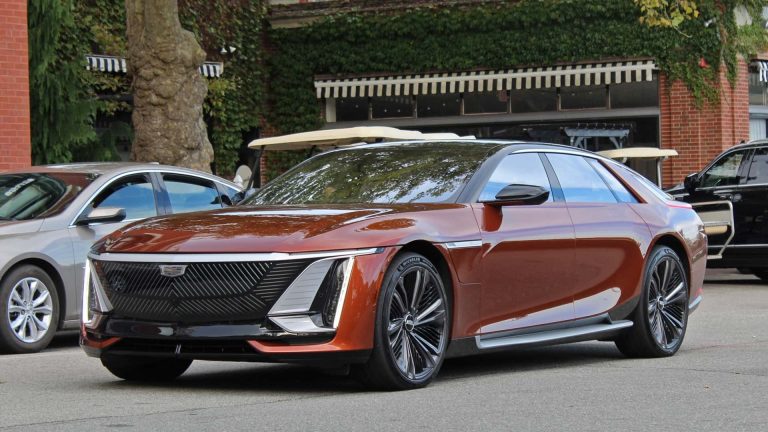
The Cadillac Celestiq starts at $340,000. It's a handbuilt ultra-luxury sedan with its sights set on Rolls-Royce and Bentley, and the first of its kind in the General Motors lineup. While nobody in the press has had the opportunity to drive one yet, I recently got the chance to ride shotgun in the Celestiq to see what all the fuss was about.
The Celestiq is the brand's most audacious car in recent memory. Not only does it stand alone in the automaker's lineup price-wise, but it's only the second high-end electric luxury car after the Rolls-Royce Specter. The Cadillac is also completely bespoke and the only EV in GM's current lineup to get a unique battery module design, which enables a thinner floor.
That long, thin battery is possible because the Celestiq is a huge car. Its scale and proportions aren't immediately obvious in photos, but standing next to it, I'm in awe of its size. I'm a few inches shy of six feet, and the 23-inch wheels are nearly up to my waist. At the same time, the roof of the car sits extremely low—well below my shoulders.

Pressing a button on the car's B-pillar swings open the passenger door, and it latches shut with a soft close. I wasn't driven long enough to get a great judgment on how comfortable the seats were, but they certainly weren't uncomfortable. But the most striking thing about sitting reclined in the Celestiq was how roomy and quiet it was.
The interior is unlike any other car I've experienced in terms of its size and shape. It's extremely wide and long inside, yet the low roof and sleek window openings make it quite cozy. The flat floor also gives a concept car vibe to the whole experience. My Celestiq had about as basic an interior as any prospective owner might spec—black-on-black with some doubtlessly real walnut trim—but it still felt special. You could even see all the way back into the carefully upholstered trunk, adding to that sensation of spaciousness.


The burnt orange exterior was one of the better colors I've seen on this car, which was still a development mule. Behind the wheel was a GM software integration engineer. I asked him what't work on this particular vehicle, and he said it was pretty much ready to go. On my side of the center tunnel was some electronic diagnostics equipment, but besides that, the vehicle seemed complete.
Browsing through menus as fast as I could, there weren't any features I tried that didn't function, including the variable-tint roof. With a single press, all the panels either go dark, remain clear, or can be adjusted individually to one of four levels. There was also an automatic setting.

The Celestiq is the brand's most audacious car in recent memory.
In terms of the ride quality, it takes the smooth, serene qualities of the Lyriq to another level. The Celestiq didn't really hit bumps; instead, it felt like it simply rose over them. Every time I spotted an imperfection on the tarmac, the Celestiq handled it better than I expected. The combination of air springs and GM's latest magnetic ride control dampers in a vehicle with such a long wheelbase was incredible.
But the cherry on top was all the minute details. Switching on the heated seats also made the armrests balmy—not a new technology, but still great to have. All four passengers get a vent between the headrest and the seat, which blows hot or cold air on your neck. Mine was just barely blowing out some hot, dry air when I got in—almost imperceptibly—but it was very pleasant.

Until we drive a carefully tailored example, although, we won't know what Cadillac has in store for buyers of its most expensive car. From my initial experience, the Celestiq checked a lot of boxes, even from the passenger's seat. But stepping into the ultra-luxury space is difficult, even with many past concept cars predicting such a move.
The Celestiq is a fantastic canvas, but seeing if buyers are truly interested in customizing this cavernous Cadillac will be the real test.
